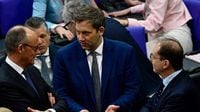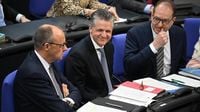On Thursday evening, March 27, 2025, the talk show "Maybrit Illner" focused on the ongoing coalition negotiations between the Union and the SPD, revealing significant tensions, particularly regarding financial matters. The discussion highlighted the challenges of reconciling differing fiscal strategies, with both sides struggling to find common ground.
Alexander Dobrindt, a prominent figure from the CSU and deputy chairman of the Union faction, voiced concerns about predictability in international relations, specifically regarding Russia. He stated, "We do not want to be predictable for Putin. Defined borders would allow for calculations of how many tanks or ammunition to order for deterrence, and that is something we want to avoid." Dobrindt emphasized the need for a strong deterrent strategy in the face of external threats.
On the other hand, Matthias Miersch, the SPD's general secretary and a key negotiator, argued that the current coalition has the capacity to act effectively, a stark contrast to the previous "Ampel" coalition's struggles. He expressed confidence, stating, "We now have what we lacked before: the state’s capacity to act." This sentiment reflects a growing urgency to deliver tangible results amidst political uncertainty.
Bodo Ramelow, representing the Left party, passionately criticized the financial strategies being proposed, particularly focusing on the 500 billion euro package intended for investments. He argued, "For me, what is laid out in the 500 billion package is investment money and not debt," and called for the elimination of special packages that he believes undermine the federal states' autonomy. Ramelow's remarks underscore the contentious nature of the negotiations, as he urged for the removal of the cooperation ban that restricts fiscal collaboration between federal and state governments.
Julia Jäkel, a media executive from Gruner + Jahr, added a layer of urgency to the conversation by stressing the importance of effective spending. She remarked, "It is really serious. We should not be discussing whether we have enough money, but whether we can spend it correctly." Her call for structural improvements resonates with concerns about bureaucratic inefficiencies that hinder effective governance.
Journalist Robin Alexander, serving as the deputy editor-in-chief of "Welt," warned of severe repercussions if a political majority in the center cannot be secured. He stated, "If this were to collapse—if we could no longer find a political majority in the center—it would have consequences that no one can take responsibility for." This highlights the precarious nature of the current political landscape and the stakes involved in the negotiations.
The panelists also noted discrepancies in the CDU's current approach compared to their pre-election promises. Alexander pointed out, "One must note: The CDU said something different before the election than what they are doing now," indicating a shift in strategy that could alienate voters.
Ramelow, visibly frustrated, criticized the military spending decisions, particularly the purchase of the F-35 jets, which he claimed German technicians cannot even control. He warned, "If we spend money in such a way that we end up getting the plug pulled by America without having any influence, then the question is whether that is the right money to invest." His comments reflect a growing concern over dependency on foreign military technology and the implications for national security.
In response, Dobrindt defended the necessity of the F-35, arguing that it is crucial for maintaining nuclear participation and security. He stated, "The F-35 is needed because nuclear participation can only be achieved through the F-35," emphasizing the importance of this military asset in Germany's defense strategy.
Despite the heated exchanges, there was a consensus among the panelists that a strong signal of progress from the Schwarz-Rot coalition is essential. Dobrindt urged, "Everyone must stop riding their hobbyhorses," highlighting the need for compromise, particularly on the contentious issue of tax policy, where the Union wants to lower taxes while the SPD aims to raise them.
The stakes are high as a 19-member "Chefrunde" is set to begin formal coalition negotiations on Friday, March 28, 2025. The biggest point of contention remains the enormous special assets and their intended use, which was a focal point of the discussion on "Maybrit Illner". Illner poignantly asked, "Money there, strategy not yet—can Schwarz-Rot still fail?" This question encapsulates the uncertainty surrounding the coalition's future.
Julia Jäkel reiterated the critical need for citizens to perceive effective governance, stating, "It is a condition for the state to succeed if the citizen feels that something is happening, that the money is being used effectively." This sentiment reflects a broader public desire for accountability and visible results from their government.
As negotiations continue, the participants are under immense pressure to find common ground on key issues such as migration, taxes, and finances. The Union's desire to relieve high earners contrasts sharply with the SPD's push to increase the top tax rate. This divergence complicates the path toward a unified financial strategy.
Friedrich Merz, the CDU leader, has set ambitious expectations, calling for a coalition agreement by Easter. He stated, "I believe it should be a time that is maximally sufficient to form a government in Germany." However, he has also acknowledged the complexities involved, emphasizing that thoroughness must take precedence over speed. "It is better to negotiate for two to three days longer and have a good contract than to argue for weeks, months, or even years," he said.
Merz's credibility has been tested as he navigates these negotiations, particularly after relaxing the debt brake and proposing a substantial debt package. He cautioned against the misconception that unlimited spending is now possible, stating, "We all must warn against the illusion that new debts practically allow for unlimited expenditures. The opposite is true."
As the coalition negotiations progress, the political landscape remains dynamic, with various factions vying for influence. Dobrindt's potential candidacy for various ministerial positions, including Interior or Defense, adds another layer of intrigue to the unfolding situation.
With three weeks until Easter, the pressure is on for Merz and his counterparts to deliver a coalition agreement that satisfies their respective parties while addressing the pressing needs of the German populace. The outcome of these negotiations will undoubtedly shape the future direction of Germany's governance and its approach to key policy issues.







